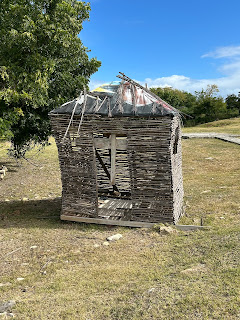Antigua may have a rich history but it's not a fairytale history where life was beautiful all the time.
As we stand out our balcony gazing at a rapturous view . . .
These ancient leftover structures dot the island--remnants of the past--reminders that when Antigua was a British colony, native Antiguans toiled on sugar plantations.
We decide to visit on of those plantations--long since inoperative-- and now a memorial to the world that was. Betty's Hope documents a plantation that existed for over 200 years. Owned by the Codrington family, it was one of the richest plantations on the island, producing sugar and whiskey. The family rarely lived on the plantation. They hired an overseer to handle the business.
The land is now barren. Two windmills still stand to greet us as we enter this place. In those days, wind power was key.
Inside the Visitor's Center, there's a model of what the plantation used to look like in the 1800's and placards documenting the history.
How much do we tell Theo, who is happily roaming the grounds, sniffing everything in his past? The story of what happened here is a near tragedy. Is he ready to hear how cruel mankind can be to his fellow man?
I keep a careful eye on Theo, but I'm not too concerned. There's little danger here.
On the grounds themselves, what remains of the great house (pictured on the placard below) stands on a hill. A fire destroyed most of it in the 1930's. The building stones were recycled to build an Anglican rectory.
Domestic and skilled workers hired to work on the plantation lived in smaller houses, made of stone.
Enslaved people were not so lucky. They lived in tiny huts made of perishable materials--mainly Wattle and Daub, which in layman's terms mean mud, manure, sticks and dried grass. There were hundreds of these huts at one time. Windows with no glass. A dried grass roof that has since deteriorated. We see one in the distance. Preserved so that we can see the bare bones of how most of the people who worked this plantation lived.
The enslaved people who lived in these huts labored in the fields and the boiling house (where they made the sugar or whiskey). I try to imagine what their life must have been like. Cramped living quarters. Too hot in the summer. No privacy.
I want to see this hut more closely. I can't quite believe that a family could live in a hut like this. As I move towards it, Dan stops me.
"By the way, where's Theo?"
I don't panic. On this plantation, dotted with ruins of a life that used to be, I should be able to spot this gangster cat in no time--sniffing the great house or the windmills or any of the other leftovers from over 200 years ago.
We retrace our steps, examining everywhere we've already been--the great house, the worker's house. Dan runs back into the Visitor's Center. No Theo.
We're in Antigua. The day is getting warmer. I think like a cat. "Where would he go? We know he loves the heat."
We gaze around.
"You don't think . . ." The Wattle and Daub house. Theo has to be there. I'm spurred on by the realization that this house had to be so hot most of the year. Theo would love it.
We take off briskly toward the Wattle and Daub hut, full of anticipation. As I'm racing towards it, I expect to see him. I know he's there.
I peek in. No Theo. What? Then I have a vision, an inspiration.
There, behind the hut in the tall weeds, curled up and practically fast asleep, Theo is napping. Totally oblivious to the tragic history that surrounds him. He looks so content, I hate to disturb him.
We meander back to our hired car, feeling blessed and so lucky.








Theo may be a gangster, but he’s also a sensitive soul!
ReplyDelete